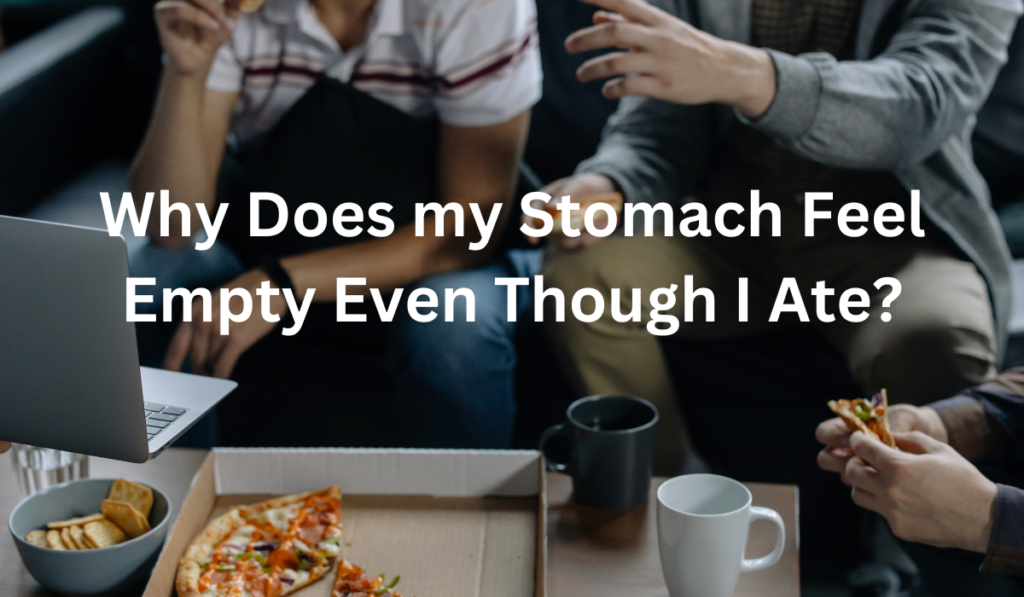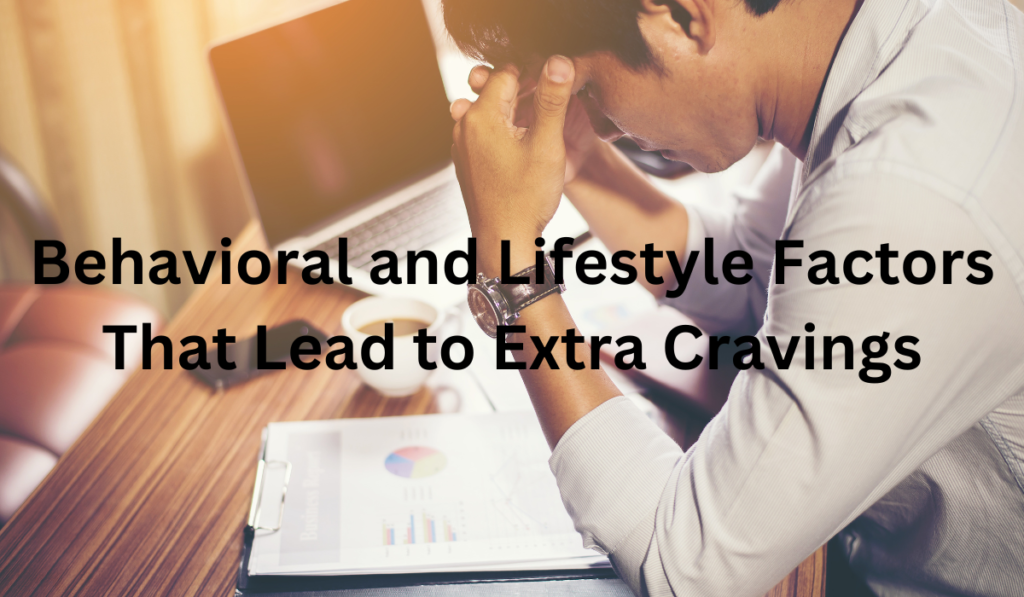
Do you ever feel hungry even after just finishing a meal? This can be a confusing and frustrating experience, but there may be underlying reasons for this phenomenon.
Symptoms like headaches, stomach aches, nausea, and irritability can arise if the issue is not addressed. To determine the cause of your untimely hunger, it is important to closely examine your daily habits.
Hunger is simply your body’s way of signaling that it needs nourishment. However, feeling hungry even after eating is a common experience for many individuals.
Why Does my Stomach Feel Empty Even Though I Ate?
It is common to feel hungry even after eating, and there could be several reasons for this. One possibility is that you didn’t eat enough food or the right kind of food to satisfy your hunger.
Another possibility is that you ate too quickly, which can cause you to feel hungry again soon after eating. Additionally, drinking too much water or other liquids during a meal can dilute stomach acid, leading to feelings of hunger.
Other factors such as stress, lack of sleep, and certain medications can also affect hunger and digestion. If you consistently feel hungry after eating, it may be helpful to talk to a healthcare provider or registered dietitian to identify any underlying issues and develop a plan for addressing them.
Let’s discuss the reasons in detail.
What are the Possible Causes Behind Your Untimely Hunger?

There are many possible reasons why you may still feel hungry even after eating a satisfying meal. Let’s explore some of the most likely explanations!
Composition of the Meal
The composition of the meal can play a significant role in whether or not you still feel hungry after eating. Meals that are high in carbohydrates and low in protein and fiber can cause a spike in blood sugar levels, which can quickly drop, leaving you feeling hungry again.
Additionally, meals that are high in simple sugars and unhealthy fats can also contribute to feelings of hunger.
On the other hand, meals that are high in protein and fiber can help you feel fuller for longer periods. Protein takes longer to digest than carbohydrates, so adding more protein to your meals can help keep you feeling satisfied.
Fiber is also essential in helping you feel fuller longer as it slows down the digestion process.
Moreover, eating smaller, more frequent meals can also help keep hunger at bay. Eating several small meals throughout the day instead of three large meals can help regulate blood sugar levels and prevent hunger pangs.
In summary, paying attention to the composition of your meals and making sure they are balanced with protein, fiber, and healthy fats can help you feel more satisfied after eating. Additionally, eating smaller, more frequent meals throughout the day can help regulate hunger levels.
Top of Form
Stretch Receptors
Stretch receptors are specialized sensory receptors located in the walls of certain organs, such as the stomach and bladder, that respond to mechanical stretching. These receptors are activated when the organ they are in is stretched beyond a certain point, which sends signals to the brain to trigger feelings of fullness or emptiness.
In the case of the stomach, stretch receptors help regulate appetite by signaling when the stomach is full or when it needs more food. This plays an important role in maintaining a healthy weight and preventing overeating.
Bottom of Form
Leptin Resistance
Leptin resistance could be another reason why you may feel hungry even after eating. Leptin is a hormone produced by fat cells that signals the brain to reduce appetite and increase energy expenditure.
When the body becomes resistant to leptin, the brain doesn’t receive the signal to stop eating and instead thinks that the body needs more food, leading to overeating and weight gain.
Leptin resistance can occur due to various reasons such as a high-fat diet, chronic stress, lack of sleep, and inflammation. It can also be caused by genetic factors and hormonal imbalances.
In addition to feeling hungry, other symptoms of leptin resistance may include difficulty losing weight, cravings for sugary and high-fat foods, and low energy levels.
If you suspect that you may have leptin resistance, it is important to talk to a healthcare professional who can help you determine the underlying cause and provide you with a personalized treatment plan.
Behavioral and Lifestyle Factors That Lead to Extra Cravings

Distractions
Studies have shown that people who eat while distracted often feel hungrier even after consuming a full meal, leading to increased food consumption throughout the day. To avoid this, it is recommended to minimize distractions and be mindful while eating.
This includes turning off electronic devices such as TVs and keeping books away during mealtimes.
Speed of Consumption of Food
The speed at which you consume your food can also contribute to extra cravings and feeling hungry even after a meal. When you eat too quickly, your brain may not have enough time to register that you’ve had enough to eat, causing you to overeat and feel unsatisfied.
Research suggests that eating slowly and mindfully can help reduce cravings and lead to feeling fuller after a meal. Take the time to chew your food thoroughly and savor each bite. This can help you feel more satisfied and prevent overeating.
In addition, practicing mindful eating and avoiding distractions while eating can also help reduce the speed of consumption and improve overall digestion. Try to avoid eating on-the-go or in a rushed manner, and instead prioritize taking the time to enjoy your meals in a relaxed environment.
Stress
When you experience stress, your body releases cortisol, which can increase feelings of hunger and cravings for food. To manage this, you can try incorporating relaxation techniques such as meditation or yoga into your daily routine to help reduce stress levels.
By reducing your stress, you may be able to decrease the likelihood of feeling hungry even after a meal and prevent excessive cravings.
Over Exercising
Over-exercising can also lead to extra cravings, especially if you are not consuming enough calories to fuel your workouts. When you exercise intensely for a prolonged period, your body may start to crave high-calorie foods to compensate for the energy deficit. This can lead to overeating and weight gain.
It is important to find a balance between exercise and nutrition to prevent excessive cravings. Make sure you are consuming enough calories to fuel your workouts and allow your body to recover properly.
Additionally, focus on incorporating a variety of nutrient-dense foods into your diet to support your overall health and fitness goals.
Inadequate Sleep
Inadequate sleep can disrupt the regulation of hormones, including ghrelin, which is often found to be higher in sleep-deprived individuals. To improve your sleep quality, try limiting your use of phones and TV before bed.
This can help you settle down faster and have a better night’s sleep.
Inadequate Amount of Food
Consider revising the phrasing of your statement:
It’s possible that you’re not consuming enough food, which could be causing you to feel hungry. To address this, aim to eat a balanced meal that fulfills all your body’s nutritional needs.
Insulin Resistance and High Blood Sugar
Insulin resistance and high blood sugar levels can lead to extra cravings. When you eat foods high in sugar or refined carbohydrates, your blood sugar levels rise rapidly, which triggers the release of insulin to bring them back down.
Over time, the cells in your body can become resistant to insulin, meaning that it takes more insulin to do the same job. This can lead to higher blood sugar levels and an increased risk of developing type 2 diabetes.
To avoid insulin resistance and high blood sugar, try to limit your intake of sugary and processed foods. Focus on eating whole foods that are high in fiber, protein, and healthy fats.
These foods will help keep your blood sugar levels stable and reduce cravings. Additionally, regular exercise and maintaining a healthy weight can also help improve insulin sensitivity.
Conclusion
Many people experience appetite imbalance and untimely cravings, but the root cause of these issues can often be determined and resolved. It’s common to fall prey to these cravings due to lifestyle changes, but trying the suggestions mentioned above can help alleviate hunger pangs and discomfort.
If these strategies don’t work, it’s important to consider seeking medical advice. There may be an underlying problem that you’re not aware of, and a physician can help identify and treat it.